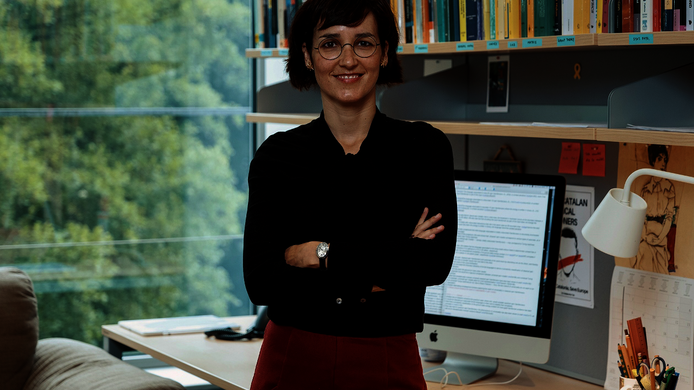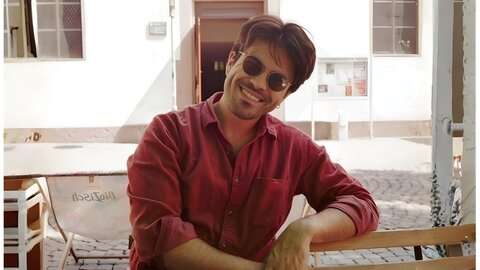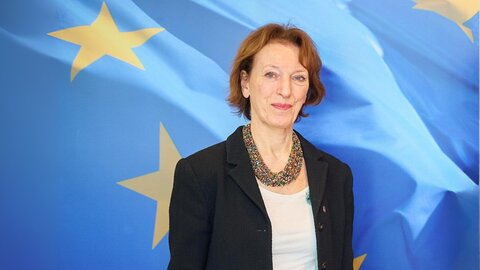The surprising simplicity of complexity

FWF: What answers is your project expected to provide? Gemma De las Cuevas: I pursue the question of why it is so easy to create complexity. We see it in physics, in biology, in almost all scientific fields: you start with very simple systems and simple rules, but the resulting phenomena become extremely complicated very quickly. Arithmetic with all its complexity is based on only a few axioms, for instance. The answer to the question of why this is so can be found in the phenomenon of universality: a system is universal if it can assume any possible level of complexity in its own field – and it is especially the very simple systems that are universal. One example of universal systems is universal spin models such as the Ising model. FWF: What does this mean? De las Cuevas: Spin models have their origin in solid state physics, where they were used to describe the angular momentum – or "spin" –- of particles. Spin models use spins to describe general degrees of freedom. Universal spin models therefore contain the complexity of all possible spin models. But this is not the only concept of universality that we know. One of the best known is found in computer science: so-called universal Turing machines, which are very simple theoretical models of computers that could, in principle, process all possible algorithms – a machine on which basically any programme can run. And then we have artificial neural networks, which are the basis for many algorithms in machine learning. All of these models contain concepts of universality that are very similar. I believe that there are fundamental connections and commonalities between them which I would like to understand better. The concept of universality is also linked to the mathematical problem of undecidability, i.e. statements that can neither be proven nor disproved. These concepts are two sides of the same coin. My research approach may also lead to a better understanding of the scope of this problem in the future. In any case, we can learn a great deal if we manage to build bridges between the various disciplines and their concepts. Perhaps lessons can also be learned for other areas – linguistics or even biology, for example. After all, the biosphere offers probably the greatest complexity to be found anywhere.
FWF: What are the first steps you will take in your project? De las Cuevas: I am going to have a larger team. At the moment, I work mainly in the field of mathematical physics, which means I come from a field that is more strongly influenced by technical issues. As of the summer, the first calls will be published and I hope to find good people. FWF: What does the START Award mean for your research activities? De las Cuevas: The question of universality has long been one of my passions. I very much look forward to being able to translate my research ideas into reality with the help of the START Award. I am grateful, happy and excited to have been given this great opportunity. FWF: What motivates you in your research? De las Cuevas: I can be motivated by great ideas – just like the idea of universality. Some years ago I read a book that I found very inspiring in this context: The Beginning of Infinity by David Deutsch. I had already dealt with universality before, but this book argues how the concept could be used to generate new knowledge. I found that very inspiring. Things like that have the power to motivate me strongly in my research.
Gemma De las Cuevas, who hails from Barcelona, is an assistant professor at the Institute for Theoretical Physics at the University of Innsbruck. Her research focus lies on concepts of mathematical physics, including theoretical concepts such as universality or undecidability. Her previous research stations included the Perimeter Institute for Theoretical Physics in Waterloo, Canada, the Max Planck Institute of Quantum Optics (MPQ) in Garching, Germany, and the Universitat Autònoma de Barcelona in Catalonia.
About the project "Universal spin models, Turing machines and neural networks": The title of the research project relates to three theoretical approaches from different sciences, which have one thing in common: although based only on simple rules, they can proffer every possible complexity in their field. The START project aims to compare this universality characteristic between the different models and illustrate connections and similarities. The aim is not only to better understand these theoretical concepts, but also to extend their applicability in science.
The START Prize The START programme of the Austrian Science Fund FWF is aimed at outstanding young researchers, giving them the opportunity to plan their research over an extended period and with a high degree of financial security. It is endowed with up to EUR 1.2 million and is one of Austria's most prestigious and most highly endowed awards alongside the Wittgenstein Award.





